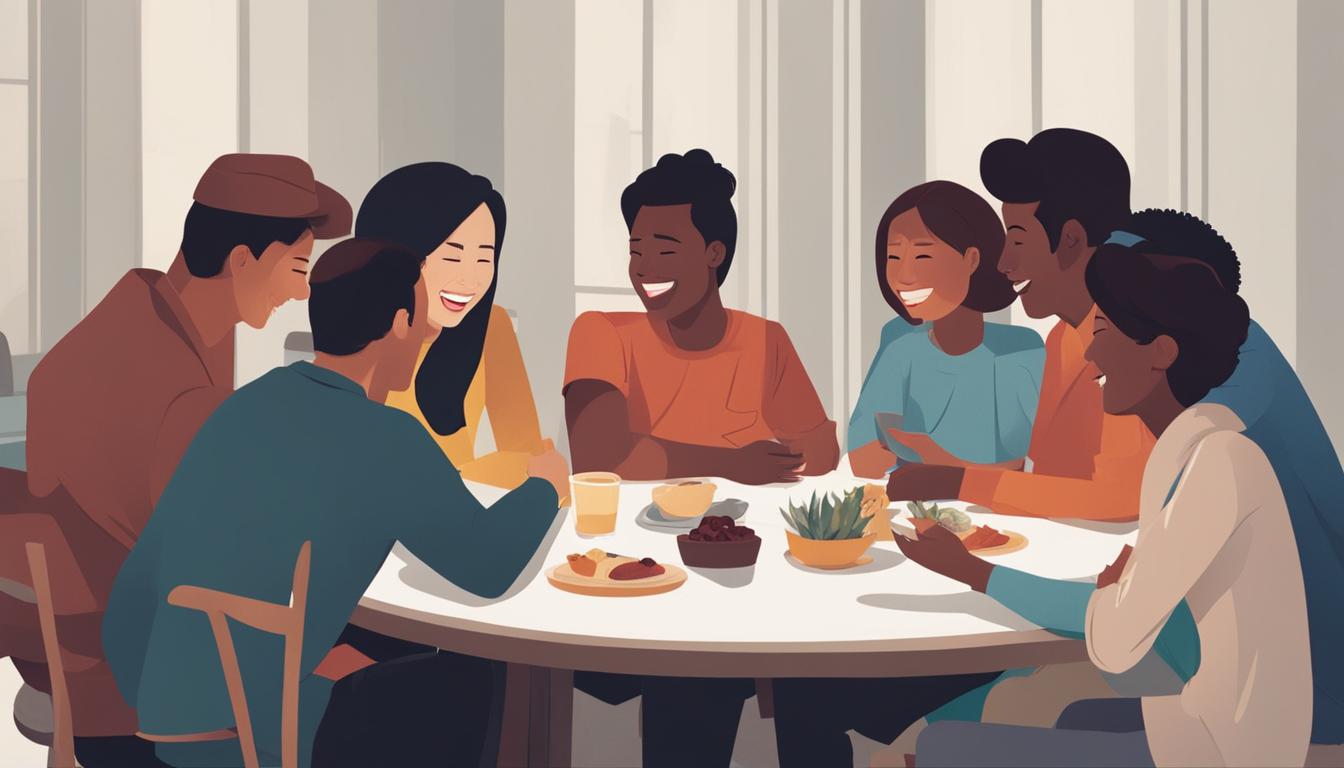Interpersonal skills are critical to building strong connections with others. However, socializing with quiet people can present unique challenges. It’s important to appreciate the unique strengths that reserved individuals offer and to learn how to engage with them effectively.
By honing your interpersonal skills and understanding introverted personalities, you can create comfortable environments and build lasting connections with quiet individuals. Whether you’re an outgoing type or an introvert yourself, these strategies can help you navigate social situations and foster meaningful relationships with reserved individuals.
Key Takeaways:
- Developing your interpersonal skills is critical to socializing with quiet people.
- Understanding introverted personalities can help you appreciate and connect with quiet individuals.
- Creating comfortable environments and using effective communication strategies can foster inclusive socializing.
- Small talk and conversation starters can help overcome initial barriers to socializing with quiet people.
- Building lasting connections with quiet individuals requires patience, empathy, and understanding.
Understanding Introverted Personalities
If you’re looking to socialize with quiet people, it’s important to understand the characteristics of introverts and how they differ from extroverts. While extroverts thrive on social interaction and find energy in being around others, introverts tend to recharge by spending time alone.
This doesn’t mean that introverts can’t be social or enjoy spending time with others. It simply means that they have a different approach to socializing and may not be as outgoing as extroverts. In fact, many introverts have strong social skills and can hold meaningful conversations, but they may need a little extra encouragement to step outside of their comfort zones.
Shy people, on the other hand, may have social anxiety or feel overwhelmed in social situations. It’s important to be patient and understanding with shy individuals and create a comfortable environment that will help them feel at ease.
Understanding introverted personalities and shyness is crucial in developing your socializing skills with quiet individuals. Remember, everyone has their strengths and weaknesses, and introverts have many unique strengths that should be appreciated.
Recharge
Introverts need time to recharge their energy after socializing, so it’s important to respect their need for solitude. This means that after spending time with an introverted friend, it’s best to give them space and allow them time to recharge and decompress.
Shyness
Shyness is not the same as introversion, but many introverts may also be shy. If you’re trying to socialize with a shy individual, it’s important to create a comfortable environment that will help them feel at ease. This could include doing an activity together that you both enjoy or having a one-on-one conversation in a quiet setting.
Building Social Skills
If you’re an extrovert looking to socialize with introverts, it may be helpful to work on your social skills. This could include listening actively, asking open-ended questions, and being patient while the introvert processes their thoughts before responding.
By understanding introverted personalities and shyness, you can develop effective strategies for socializing with quiet individuals and fostering meaningful friendships.
Creating Comfortable Environments for Shy Individuals
If you have a shy friend or want to encourage more socializing with quiet individuals, it’s important to understand their comfort zones. Everyone has different social needs, and shyness can make some social situations uncomfortable for quiet individuals. Here are some tips to create a comfortable and inclusive environment for shy individuals:
- Be mindful of social situations: Keep in mind that some social situations can be overwhelming for individuals who are naturally shy. Consider smaller gatherings or events with more meaningful interactions to help your shy friend feel more comfortable.
- Understand their comfort zone: Respect their boundaries and understand what makes them feel comfortable. Don’t push them to do something that makes them uncomfortable, but encourage them to step out of their comfort zone in a supportive way.
- Foster inclusivity: Encourage everyone to participate in the conversation and make an effort to include quiet individuals. Don’t let them feel left out or like they don’t have anything meaningful to contribute to the conversation.
- Build meaningful friendships: Focus on building deeper connections with quiet individuals. This can involve one-on-one conversations, activities or hobbies that you share, or simply spending more time together to build a stronger rapport.
Remember that socializing with quiet individuals doesn’t have to be intimidating. With the right approach, you can create a comfortable environment that encourages them to come out of their shell and build meaningful connections.

Effective Communication Strategies
Connecting with quiet individuals may require developing different communication strategies than those used with outgoing types. The following techniques can help you build relationships based on trust, mutual understanding, and respect:
- Active listening: Paying attention and demonstrating a genuine interest in what the other person is saying can help build rapport and trust. Engage in attentive listening by nodding, using eye contact, and paraphrasing what was said.
- Asking open-ended questions: Questions that can’t be answered with a simple “yes” or “no” can encourage more in-depth conversation and help quiet individuals feel heard and valued.
- Using empathy: Acknowledging and validating the other person’s feelings, opinions, and experiences can build trust, foster empathy, and nurture a sense of connection.
- Encouraging self-expression: Allowing quiet individuals to express themselves at their own pace and through their preferred methods can help them feel more comfortable and open up, leading to more meaningful conversations.
- Using praise and positive reinforcement: Acknowledging a person’s strengths, achievements, and positive characteristics can build self-esteem and create a supportive environment for building deeper relationships.
Remember to adapt your communication style to meet the needs of the individual and avoid overwhelming them with too much information or questions. Take the time to get to know each other, and respect each other’s boundaries and preferences.
Example:
“One of the things I appreciate most about you is your ability to listen actively and really understand where I’m coming from. It makes me feel heard and respected, and I value our conversations because of it.”
– A quiet individual you’ve built a strong connection with
By using these communication strategies, you can build stronger, more meaningful relationships with quiet individuals.
Starting Conversations with Quiet People
Starting conversations with new people can be challenging, especially if they are on the quieter side. However, with a few simple tips, you can engage in meaningful conversations with quiet individuals and foster connections.
Effective Small Talk
Small talk is a great way to break the ice and start a conversation. When speaking with quiet people, it’s important to keep the conversation light and positive. Avoid controversial topics or anything that could make them feel uncomfortable. Start by asking simple questions related to their interests or hobbies. For example, “What kind of books do you like to read?” or “Have you seen any good movies lately?”
Asking the Right Questions
When speaking with quiet individuals, it’s important to ask open-ended questions that encourage conversation. Avoid questions that can be answered with a simple “yes” or “no.” Instead, ask questions that require more thought and explanation. For example, “What do you enjoy most about your job?” or “What kind of music do you like to listen to?”
Conversation Starters for Quiet People
If you’re struggling to come up with conversation topics, try using conversation starters. These can be great icebreakers and help the conversation flow more easily. Here are a few examples:
- “Do you have any plans for the weekend?”
- “What’s your favorite thing to do in your free time?”
- “Have you traveled anywhere interesting lately?”
Remember, when starting a conversation with quiet people, it’s important to be patient and give them time to respond. Don’t rush the conversation or interrupt them. By following these tips, you can start engaging conversations and build connections with quiet individuals.

Understanding and Embracing Introverted Personalities
If you want to connect with quiet individuals, it’s important to understand their hobbies and interests. This will help you bridge the gap between outgoing types and introverts, fostering understanding and connection.
One way to gain insight into the world of introverts is to visit WikiHow, where you can find numerous articles on how to connect with quiet individuals. From learning how to strike up a conversation to discovering hobbies that are popular with introverts, WikiHow can be an excellent resource to help you build meaningful relationships with introverted individuals.
Another way to connect with quiet individuals is to discover their hobbies and interests. Some popular hobbies of introverts include writing, reading, painting, and hiking. If you share any of these hobbies, you can use them as a starting point to engage with introverts.
It’s important to remember that introverted individuals may not always want to engage in socializing activities. They may prefer to spend time alone or engage in quieter activities. It’s essential to respect their boundaries and needs.
Tip:
“Don’t shy away from asking your introverted friend about their interests and hobbies. This can lead to meaningful conversations and help you build a stronger connection.”
By understanding and embracing introverted personalities, you can connect with quiet individuals and build lasting friendships. Whether it’s discovering shared hobbies, exploring WikiHow, or simply respecting their boundaries, connecting with introverts can be a rewarding experience that leads to meaningful relationships.
Nurturing Inclusive Socializing
Social events can often be overwhelming for quiet individuals, so creating a comfortable and inclusive environment is crucial. In today’s digital age, using social media platforms can also be a powerful tool in building relationships with shy individuals.
Building rapport with quiet individuals requires patience and understanding. One way to foster inclusivity is by creating opportunities for group activities that cater to everyone’s interests. By providing options that are not solely focused on loud, extroverted activities, you can encourage quieter individuals to participate and feel more comfortable.
| Comfortable Environments for Shy Individuals | Nurturing Inclusive Socializing | |
|---|---|---|
| Definition | Find out how to create comfortable environments for shy individuals | Discover strategies for nurturing inclusive socializing |
| Goal | Encourage social interaction | Build rapport and create comfortable environments for quiet individuals |
| Keywords | Socializing, Shy Friend, Meaningful Friendships, Comfort Zone | Social Events, Social Media, Building Rapport with Quiet Individuals, Creating Comfortable Environments for Shy Individuals |
Social media can also be a great way to connect with quiet individuals and build meaningful relationships. You can start by following their interests and hobbies and engaging with their posts or messages. This can help to establish common ground and create a space for inclusive communication. However, it’s important to avoid overwhelming them with too many messages or questions, as this can be counterproductive and may cause discomfort.
Remember to be respectful of their boundaries and comfort zones. Taking the time to understand their preferences and needs can go a long way in building lasting connections and promoting inclusivity.

“Socializing is not about being the loudest or most talkative person in the room. It’s about creating a safe space for all individuals to connect and build relationships.”
Overcoming Barriers and Discomfort
When socializing with quiet individuals, it’s common to experience feelings of politeness, nervousness, discomfort, and potential rejection. These emotions can create barriers to effective communication and hinder your ability to establish connections.
However, it’s essential to remember that these emotions are normal and can be overcome with the right mindset and approach. Here are some effective strategies to help you overcome these barriers:
| Strategy | Explanation |
|---|---|
| Focus on the person, not the quietness. | Instead of focusing on the fact that the individual is reserved, shift your focus to the person’s unique interests and strengths. This can help you find common ground and develop a more meaningful connection. |
| Address your nervousness. | If you’re feeling nervous, take a deep breath and remind yourself that it’s okay to feel this way. Try to focus on the present moment and engage in active listening to help you relax and connect with the person. |
| Handle discomfort with grace. | If you sense discomfort, try to address it with grace and empathy. Acknowledge the individual’s feelings and offer reassurance that you’re there to support them. |
| Offer compliments. | Compliment the individual on their strengths and accomplishments. This can help them feel more at ease and build their confidence in social situations. |
| Handle rejection respectfully. | If the individual declines an invitation or seems uninterested in socializing, respect their boundaries and don’t take it personally. Remember that everyone has different social preferences and respect their decision. |
Building Lasting Connections
Connecting with quiet individuals can be a challenge, but it’s worth the effort. By taking the time to understand and appreciate their unique strengths and personalities, you can build lasting connections with reserved people.
Understanding and Connecting with Reserved People
Reserved individuals tend to be more introspective and may prefer deep conversations over small talk. When interacting with such individuals, it’s important to be patient and allow them to speak at their own pace. Avoid interrupting them or dominating the conversation as this can make them feel uncomfortable.
One way to connect with reserved people is to find common ground. Look for shared interests, hobbies, or values and build conversations around them. By focusing on topics that they are passionate about, you can help the conversation flow naturally and create a deeper connection.
Methods of Engaging with Introverted Individuals
Introverted individuals tend to recharge their energy through solitude. Respect their need for alone time and avoid pushing them to engage in social activities when they’re not up for it. Instead, try to engage with them in ways that fit their preferences. For example, you could invite them to a quiet dinner rather than a loud party.
Another effective way to engage with introverted individuals is through shared activities. Activities such as hiking, painting, or listening to music provide non-threatening environments that allow for natural interaction. This can be a great way to build connections and create lasting friendships.
Socializing Skills with Quiet Individuals
When socializing with quiet individuals, it’s important to practice good communication skills. Use active listening to understand their point of view and show that you are interested in what they have to say. Avoid interrupting or finishing their sentences for them, as this can be perceived as rude or dismissive.
Another key skill when socializing with quiet individuals is to be inclusive. Make an effort to engage all members of the group, including the quieter ones. Avoid letting the conversation be dominated by one or two people and make an effort to draw out the quieter individuals.
By understanding and embracing reserved personalities, using effective communication strategies, and practicing inclusive socializing tactics, you can build lasting connections with quiet individuals. Remember, building relationships takes time and effort, but the rewards are well worth it.
FAQ
How do I socialize with quiet people?
To socialize with quiet people, it’s important to approach them with understanding and respect. Give them space and time to express themselves, actively listen to what they have to say, and avoid putting them on the spot. Creating a comfortable and inclusive environment can help them feel more at ease and open up in social settings.
What are introverted personalities?
Introverted personalities are individuals who tend to be more reserved and quiet. They often prefer solitude and find social interactions draining. Understanding introverts involves recognizing their need for alone time to recharge their energy and appreciating the unique strengths they bring to relationships and group settings.
How can I create a comfortable environment for shy individuals?
Creating a comfortable environment for shy individuals involves being understanding and empathetic. Respect their boundaries and avoid pressuring them into social situations. Foster inclusivity by encouraging open and non-judgmental conversations, and make an effort to build meaningful friendships based on shared interests and common ground.
What are some effective communication strategies for connecting with quiet individuals?
Effective communication with quiet individuals includes giving them space to express themselves and actively listening to what they have to say. Use open-ended questions to encourage their input and avoid dominating conversations. Building rapport and trust is key, so be patient and understanding in your interactions.
How can I start conversations with quiet people?
Starting conversations with quiet people can be done by engaging in small talk and asking open-ended questions. Avoid putting them on the spot or pressuring them to speak, and instead create a comfortable and relaxed atmosphere. Utilize conversation starters that are relevant to their interests and allow them to share at their own pace.
How can I understand and embrace introverted personalities?
Understanding and embracing introverted personalities involves recognizing and respecting their need for solitude and quiet time. Take an interest in their hobbies and interests, and find common ground to bridge the gap between outgoing types and quiet individuals. By fostering understanding and connection, you can build stronger relationships.
What strategies can help nurture inclusive socializing?
To nurture inclusive socializing, it’s important to navigate social events with sensitivity and inclusivity. Create environments that cater to different personalities and comfort zones. Leverage the power of social media to connect with quiet individuals and provide opportunities for meaningful interactions. Foster a sense of belonging and encourage everyone to participate.
How can I overcome barriers and discomfort when socializing with quiet people?
Overcoming barriers and discomfort requires patience and understanding. Be polite and respectful when engaging with quiet individuals, and address any nervousness or discomfort that may arise. Give compliments genuinely and avoid overstepping boundaries. If faced with rejection, gracefully accept it and continue to foster a friendly and supportive atmosphere.
How can I build lasting connections with quiet individuals?
Building lasting connections with quiet individuals involves understanding and connecting with their reserved personalities. Use effective communication strategies, such as active listening and open-ended questions, to foster meaningful conversations. Develop socializing skills that cater to their needs, and create environments that allow them to feel comfortable and valued.

